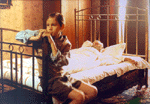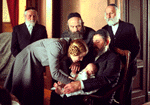
| Erzsi Báthory | The store and the family |

|
Frigyes Gödrös: Glamour
 Togay Jonas 26 Kbyte |
Two Hungarian sagas have been made recently (none earlier), and by accident (?) almost at the same time: Sunshine (directed by István Szabó) and Glamour (directed by Frigyes Gödrös). When brooding over Frigyes Gödrös’ Glamour, as I am doing now, one cannot help recalling the essay written by Ágnes Heller, "A parvenűk kora" (The Age of Parvenus), which contributed to the debate about Sunshine. Yet, the constraint of comparison between the two films starts to operate regardless of what was mentioned above, unintentionally. And not only because both of them tell the story of Hungarian, well-to-do, middle-class families of Jewish origin, and not because both, almost necessarily put the emphasis on the period between the 1930es and the 1960es, that is, on the events that took place in the era of Fascism and Communism, but also because the two films give rather different, although historically authentic answers to the raised questions. In Sunshine, István Szabó portrayed the true story of the three successful generations of a Hungarian parvenu family of Jewish origin (including a judge of military tribunal, a high rank state official, a high rank army officer, an olympic champion, a high rank ÁVH /State Defence Authority/ officer), and not that of pariahs. Parvenu or pariah? Vali in the film is neither one, nor the other, although she is the only one who can remain herself all along, or at least the one who does not lose herself even though she loses everything else. Szabó’s film, after all, is a true, lively, spectacular and moving parable about giving up the identity (based on a 300-year-old religion, and organised around a strong community that keeps its own laws and traditions) and the price they have to pay for it. On the other hand, Glamour is not a story of straight, unbroken line, not a complete story, not a parable, and not even an edifying portrayal of the life of a minority. Glamour is a real, ordinary saga which is a tale in its form. The film is centered around a Hungarian Jewish family which is not motivated by the wish to assimilate, to emerge or to be successful, but by the mere survival of the family. For the Gold family, the store is (one of) the only guarantee(s) to survive. The furniture shop of the family provides the setting. Regarding its interior, it changes from time to time, according to the historical environment, although it is an essentially unchanged, almost constant place. The grandfather and the father are furniturers, and later, the son will become one, too. We do not know how the shop was born, but it exists, and we feel as if it has always been there. It never expands to be a department store or shrinks to the size of a tobacconist’s (from time to time its stock is sold out, then later returns). The store does not only ensure living, but most important of all it represents independence, provides a respectable social position, continuity and permanence in the times of historical change, and also creates human dignity based upon professionalism and financial security. The shop is part of life and part of the family. The family and the shop mutually suppose and strengthen each other. The store ensures reasonable wealth for the Golds. (I have personal experiences in this field. My grandmother, who became widowed during World War One, sent my father to work as an apprentice in the highly respected Csillag (‘Star’) Bookstore. First my father worked as an apprentice, but in the course of time became the most respected employee. His professional and family-founding ambitions, however, encouraged him to start his own business, making use of the economic prosperity. He loved both his profession and the books. The bookshop in Pál Vásárhelyi Street was almost like a member of our family, since it made our family’s life complete. We lived on it, meanwhile we constantly had to take care of it. The store was taken over in 1952. My parents were expecting it, although were reluctant to really believe it; my father’s license was withdrawn and the complete stock and furniture, estimated only HUF 1,000 was bought up. My father was only 39 years old then. Within the blink of an eye, his past and future were pulled out of him, his expertise and experience were no longer needed, his life became annulled, and his living was made insecure. All this is represented by a shop.) The Golds in the film are held together by an invisible unity. The grandfather who respects religious and family traditions, who is sometimes stagy, but also extremely pragmatic with healthy wit and good sense of humour; the younger son, the romantic and adventurous army officer; and the older son, the father, who becomes the head and stronghold of the family, a decisive and responsible character, who takes care of everybody else in the family. By a strange coincidence, and almost as a gift from God, the mother, a charming nursery school teacher from imperial Germany arrives and gives birth to the two sons. The employees also belong to the family (they never fluctuate and in the film are called and differentiated by names the child can also hear): Gréti, Huberjani and Árjaanti, as well as the match-maker, a typically childish man with knowledgeable, traditional looks. They all hide under the huge desk and in the secure cellar during the menacing period of the Arrow Cross movement. But what is it that creates the uniform atmosphere which makes us, viewers, feel so much at home in their company? It is love. These people simply love each other. The love for the family and for each other interweaves their life. They never talk about it, they do not suffocate each other with love, they do not terrorise each other, they do not make scenes, although the rabbi grandfather occasionally excommunicates somebody of the family and these scenes are always dramatically effective, nonetheless amiably inefficient. They act completely naturally, they live their own life, while respecting the others, but all the time there is an indissoluble bond between them. Religion is a private matter in the Gold family. It is an important factor, an (often indispensable) element of life (and of survival), but it is not a dogma or a constraint, rather something to respect (or bear), and occasionally, - God forbids - to be made profane. Just like the celebration of the seder - a Biblical, sacred and profane event in the stormy night, along with the jumping frogs (one of the seven disasters) and the waiting for the Messiah. Another truly Biblical scene in which honourable patriarchs, led by the grandfather, are about to circumcise the first grandson and the parents surprise them. As the father raises the ‘rescued’ baby in the air, the camera is zooming at him between the grandfather’s arms raised in curse, thus the gesture becomes self-revealingly protective. Nevertheless, playfully profane is the scene in which the lovers, forbidden to touch each other for months, can love each other in the moment of absolution, and run to the nearest shelter, the confessional, to finally have each other. In the house of the Golds, life does not strive to reach outward and upward, but it operates, takes place and survives in its real place. The outside world does not strike in there destroying everything, but appears, becomes disarmed, sucked in and gets eliminated. The Reds, the Russians, the Arrow Cross soldiers, the Communists, all walk in here, then leave (with a photographer and with an invisible camera mounted on their vehicle, which makes the marching grotesquely stylised), without causing any damage, because they cannot do any harm. ‘They will bring them back’, says the grandfather cheerfully, as the furniture ‘walk’ out of the store one by one. The Gold family is represented by Vali in Sunshine. In the age of parvenus, they are neither parvenus, not pariahs, they are simply themselves. Vali’s secret of the Gold family is protective love. Frigyes Gödrös has already paid tribute to this family in the film Priváthorvát and Wolframbarát, which he made with Dr Putyi Horváth. The parallel story of the Wolfram family recorded on an imaginary videofilm, and the true story of the watch-maker living in Ugocsa Street, recorded on 8-mm film differ a lot from each other (in terms of ancestors, religion, traditions, customs, lifestyle, living and environment), but their lives are basically similar in one aspect: they had their own scales of values, they were proud of who they were and stuck to it all along. They had their ideas to believe in. And they believed in something! Glamour is a biographical saga, just like Priváthorvát and Wolframbarát. The latter one, however, is wittier, more grotesque, and as opposed to its occasionally absurd images and tone, in Glamour we feel a stronger nostalgia for gone-by childhood, disappeared family values, and a world once so translucent, and so much easier to handle in spite of all its horrors, and indeed, that is what makes the film more emotional. We see the story through the director’s eyes, the poetic narration of the adult director (interpreted by László Helyey’s deep, warm voice) only explains or counterpoints the story, which makes the film more elevated, more emotional. The fairy-tale like visions and images of the child’s memory and imagination (the garden, the flat, the interior of the church) appear in an unbelievable unity and with fascinating richness through Sándor Kardos’ camera. This viewpoint is almost unbroken although it has outstanding, film historically excellent moments. The little boy, growing up lonely, makes friends with two animals, first Matild, the speckled hen, then one of the carrier pigeons of the village house, but the adults kill both and serve them on the dinner table. Although the healthy vision of the viewer is faced with both scenes, since the hen (and the pigeon) is basically foodstuff, with the kids we feel the tragedy of the moment, which thus becomes both amiably tragic and comic at the same time. Almost all the events are set in places where the members of the family live or stay, and yet the events of 1956 seem to be taking place somewhere far away on a distant planet (the idea is strengthened by the ’moon walking’ boots of the tram driver), as if in a dream, or as if the scene were created out of half-conceived and overheard sentence fragments in the imagination of the child, spared from the inconceivable. The soundtrack of the film and the musical motives of the plot are uniform, characteristic and extremely melodic (composed by László Melis). In the first version of the film, shown at last year’s Film Week (Glamour - Fragments from a family’s life), there was no narrator as yet, his role was ‘played’ by captions in the starting pictures of the episodes: The Store - 1919; The Match-maker - 1935; The Legal Advisor; The Judge of the Blood Council ...; The Needle, etc. This version ends with the grandfather’s death and the little boy’s words ("and from now on there will be nothing else in this world but grandpa’s death ..."), and is drier, more stylised and more pantomime-like - and shorter - compared to the final version. In general, it resembled the plot and style of Priváthorvát és Wolframbarát. The final version of Glamour is much longer. The shooting of the film lasted for years and had to be frequently suspended, which explains why scenes are occasionally long and over-explained (e.g. the mother’s elder brother’s monologue in bed about the bed, the interrogation and temptation of Father Pelbárt), with frequent scenes when nothing happens, while the proper direction of the actors and actresses is often lacking. The final version of Glamour became a film of love and farewell. As opposed to the rising sun before the credits of the first version, what we see here during credits is the golden, cloudy phase-images of the solar eclipse, and probably not only because of last summer’s sensation, the total solar eclipse, but rather to strengthen the motive of death-change-farewell. The story of the family became more complete. The plot begins with the already quoted seder evening, where the narrator in his warm voice deepened to be more emotional introduces us the family, and we meet not only the main characters, the grandfather and the two little boys (whom we will see again later as adults), but also their future fate. The story of the love and marriage of the father and the mother became fulfilled, therefore the dedication at the beginning is not by chance: To my parents. Their adventurous wedding, the expression and episodes of their love towards each other interweave the whole film. The mother’s death puts an end to the history of the family. In the ending images, all the characters of the film appear on the merry-go-round of Városliget, and the ethereal meeting of the father and the mother takes place in front of them. Their pressed cheeks is the closing scene of the film. The re-living of love that keeps the family together, the irrevocable ending, the disappearance of the beloved parents, the love-girdled childhood and the final passing of memory-packed past make it the film of love and farewell, and that is what we can best ‘receive’ today. The makers of the film were brave enough to undertake this. Both Sunshine and Glamour have triggered disputes. In the first case, the dispute was about whether Sunshine is a true and authentic film of Jews, of Hungarian Jews, while the other debate dealt with whether it was a political propaganda film, supporting assimilation or it was simply a kitsch. I do not believe that the final, decisive words can ever be said, nevertheless, everybody has the right to say what they think. Why did these Jewish sagas turn up all of a sudden towards the end of the 20th century? Ágnes Heller offers an acceptable explanation to this: the age of parvenus is over, generation stories in which Jews were the most involved have come to an end. Is Glamour a political propaganda film? "... And just like a Rousseau in Ermenonville, I will be a man and a citizen ...", a Hungarian poet called Mihály Csokonai Vitéz wrote these lines about 200 years ago. I suppose the Gold family would have written something similar about themselves if they had had to. Fortunately, Frigyes Gödrös made a film instead.
|  György Barkó 37 Kbyte
|  Károly Eperjes 23 Kbyte
|  Eszter Ónodi 26 Kbyte
|  György Barkó 34 Kbyte
|  32 Kbyte
|  36 Kbyte
|  Frigyes Gödrös 30 Kbyte |